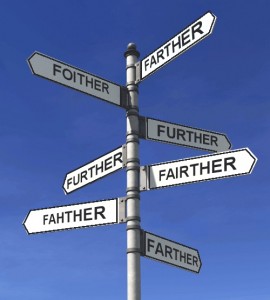Instead of arguing about something important, such as whether Michael Jordan’s first three-peat Chicago Bulls could beat the Babe Ruth / Lou Gehrig-era Yankees in a mixed martial arts tournament, the family was arguing about the “correct” way of pronouncing a word.
“We always said it EE-ther,” I said, “That’s how real Americans from the Great Lakes region talk.”
“Out West we say EYE-ther,” my wife said, “As in ‘EYE-ther you go to bed right this second, or you’ll end up with a black EYE.'”
We turned to Pops to cast the deciding vote. “My Scottish forebears taught me to say the word as AY-thair.”
Lucky for us the spelling of the word either has been frozen for a few hundred years. Otherwise somebody might conclude, based on our three regional pronunciations, that we were actually using three different words, with unique spellings and unique definitions. Maybe they would think:
Eyether: an adjective meaning a choice between two alternatives. “You can have eyether bacon or spam on your pizza.
Eether: an adjective meaning a choice among several (more than two) alternatives, as in, “Eether we go to Harvard, MIT, or the International House of Pancakes for breakfast.”
Aythere: an adjective meaning you don’t really have a choice. It is only used to indicate a threat or ultimatum, in which the alternative is left unspoken, because it is understood to be so horrifying that it is not really something anyone would pick. As in, “Aythere you pay up to Knuckles here, or, well, you know.”
Naturally this is all silly. Almost every word has a whole range of pronunciation. We don’t split tomato and tom-ah-to into different words with new spellings and new definitions. We just write tomato. Because it has a standard spelling and definition, people can say it however they like and it doesn’t splinter into new words.
Yet, somehow our English teachers have latched onto the idea that further and farther are two separate words that have unique definitions. They will mark these sentences as incorrect:
Jimmy walked out further on the diving board.
He was dreaming farther into the future about winning the Cannonball Competition.
Farther is supposed to be used only for describing physical distances, such as swimming a mile farther from shore. Further is reserved for describing when things happen in time, as in “We will discuss the unfortunate swimming suit malfunction further at our meeting tomorrow.”
But people don’t usually make any distinction between the dimensions of physical distance and time when they talk. There is no confusion at all in this exchange, even though the word long implies physical distance:
“How long did you sleep?”
“About six hours. Is the meeting over?”
It’s obvious what happened. When dictionaries were being compiled for the first time way back when, one logophile collected the word farther, and another researcher collected the word further. Their differing spellings were based on varying regional pronunciations of the same word, which had the general meaning of “go some more”. Once established in the dictionary as two separate words, over time they acquired slightly divergent definitions, so that now, you can’t correctly say:
Bringing my pet tarantula to the office did not farther my chances for promotion.
It is about time to admit that the dictionaricrats blew it a long time ago. Further and farther are the same word and we should stop smacking kids down when they use them interchangeably. And to avoid confusion in the future, the new, unified form of these two words should be re-branded, with a new spelling, based on the classical Brooklyn form: foither.
And while we’re at it, let’s stop harping on kids who confuse these supposedly different words:
sit and set
lay and lie
I’d bet a half dozen donuts that these words split off from common ancestors years ago, and despite what the dictionary insists, people continue to use them interchangeably. I know there are plenty of reasons why one needs to know the “correct” usage of each. But do these rules of correctness really add meaning to our language, or are they just more silliness?
I’m sure to write foither on the topic.
